Tropical paradise
One of the best known holiday destinations in Queensland has to be the Whitsundays. Palm fringed, pristine beaches, countless, unspoiled islands and reefs, surrounded by clear, warm water in all shades of blue, creating a unique tropical paradise. And, best of all, Lake Proserpine –another great Barra dam – is only a short drive away.
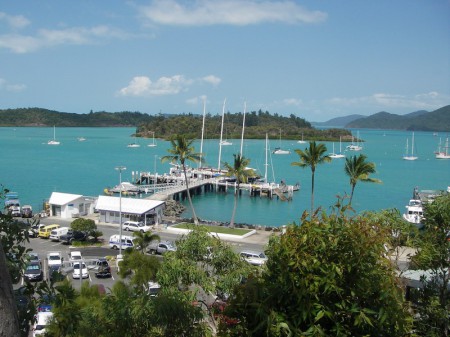 It is an easy 500 km trip from Gladstone to the Whitsundays along the Bruce Highway. Just after Gladstone, we pass a huge coal train and count exactly 100 coal carriages and 3 huge diesel engines. On the way north, we have to pick up our mail in Rockhampton, sent to us Poste Restante as usual and waiting for us. Earlier this year, Rockhampton was severely affected by the floods of the Fitzroy River for several weeks and large parts of the city went under water.
It is an easy 500 km trip from Gladstone to the Whitsundays along the Bruce Highway. Just after Gladstone, we pass a huge coal train and count exactly 100 coal carriages and 3 huge diesel engines. On the way north, we have to pick up our mail in Rockhampton, sent to us Poste Restante as usual and waiting for us. Earlier this year, Rockhampton was severely affected by the floods of the Fitzroy River for several weeks and large parts of the city went under water.
While travelling through Mackay, this time just acting as a short stopover to stretch our legs, we remember our last trip 10 years ago, when we spent memorable time here and further west, up in Eungella National Park. Eungella is a great little place in the mountains about 600m above sea level and features stunning rainforests; platypus are common in its relatively cool mountain streams and there are numerous walking tracks to explore the area. And yes, there is another dam up there of course, home to enormous Sooty Grunter.
From Mackay it is just a little more than another 100km and we are in Proserpine. We decide to stay in Proserpine rather than in the Whitsundays, because Prosy is situated just about half way between Lake Proserpine and the Whitsundays. One of the first things we do is paying the local tackle shop, Proserpine Bait & Tackle, a visit and asking for the latest fishing news. Lindsay Dobe – owner, fishing guide and Barra expert par excellence – tells us that the water temperature is still a bit on the cool side with 20 to 22°C, but with warmer weather moving in, the fishing is expected to improve. He points out some of the current hotspots on the lake and with his sound advice we tackle the task. We manage to get some nice fish, but some days, nothing seems to work and we even try a bit of Harry Potter magic, but not even our ‘Fishy, fishy, don’t be shy, grab our lure or we might cry!’ spell makes a difference.
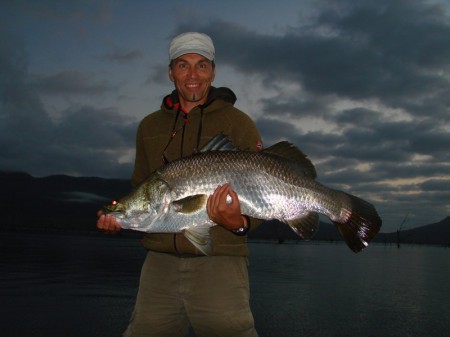
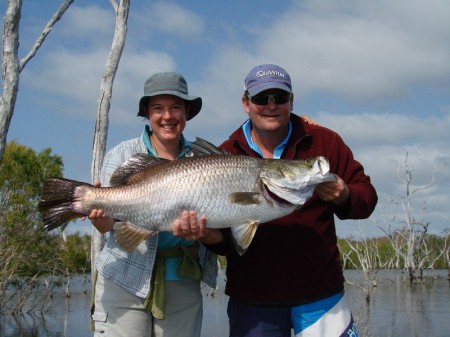
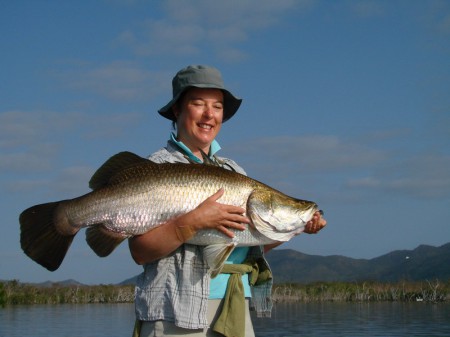 We have the great pleasure to spend time on the lake with Lindsay and love every minute of it. He is not only an amazing guide indeed, but also excellent company and we learn a lot new tricks (fish the sexy looking trees….) once again and laugh together till our tummy muscles hurt. Lindsay’s Nitro bass boat is a purpose built fishing machine and our own boat seems small and flimsy in comparison. Flying over the water with more than a hundred kilometres an hour is a thrilling experience and we squeal like kids.
We have the great pleasure to spend time on the lake with Lindsay and love every minute of it. He is not only an amazing guide indeed, but also excellent company and we learn a lot new tricks (fish the sexy looking trees….) once again and laugh together till our tummy muscles hurt. Lindsay’s Nitro bass boat is a purpose built fishing machine and our own boat seems small and flimsy in comparison. Flying over the water with more than a hundred kilometres an hour is a thrilling experience and we squeal like kids.
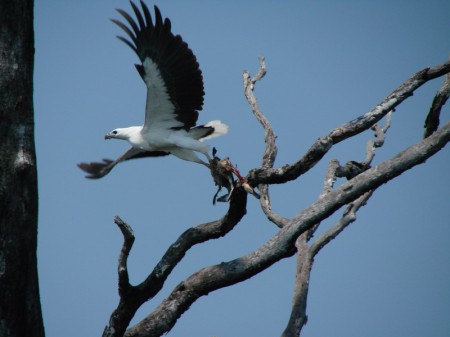 Lake Proserpine has heaps of dead, standing timber and it sometimes feels like fishing in a forest. Orchids and other epiphytes grow in some of the trees and eagles use them as nesting sites. At some stage we even see a White-breasted Sea-Eagle with a freshly caught and half eaten duck in its claws.
Lake Proserpine has heaps of dead, standing timber and it sometimes feels like fishing in a forest. Orchids and other epiphytes grow in some of the trees and eagles use them as nesting sites. At some stage we even see a White-breasted Sea-Eagle with a freshly caught and half eaten duck in its claws.
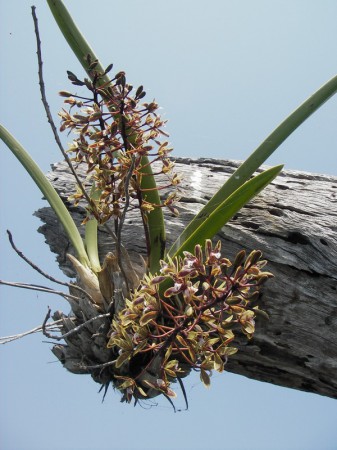 Ten days after our arrival in Proserpine, we have to look for a new place to stay, because Proserpine Tourist Park is booked out. Seabreeze Caravan Park in Cannonvale, in the heart of the Whitsundays, becomes our base for the next couple of weeks. Just after 4am early one morning, on the way to the lake, a wallaby appears out of the dark and jumps right into our path. We manage to reduce our speed a little, but avoiding a collision is impossible and we hit the animal hard and with a loud bang. The impact is massive and the car veers to the right. Luckily there is no oncoming traffic and we pull up on the side of the road. We are prepared for the worst and – with trembling knees – inspect the front of the car with a torch. Miraculously, we can’t see any damage at all. The bull bar did exactly what it is supposed to do and took all of the impact. The poor wallaby wasn’t that lucky though and lies dead in the middle of the road. It is a strange and sad feeling to pull the lifeless body off the tarmac; it is still warm and the fur feels very soft. After a couple of minutes sitting in the dark and gathering ourselves, we continue our drive. Having driven many thousands of kilometres on Australia’s roads on several trips, this is the first time we’ve hit a kangaroo or a wallaby. To stick to our policy not to drive at night whenever possible, seems to make more sense than ever.
Ten days after our arrival in Proserpine, we have to look for a new place to stay, because Proserpine Tourist Park is booked out. Seabreeze Caravan Park in Cannonvale, in the heart of the Whitsundays, becomes our base for the next couple of weeks. Just after 4am early one morning, on the way to the lake, a wallaby appears out of the dark and jumps right into our path. We manage to reduce our speed a little, but avoiding a collision is impossible and we hit the animal hard and with a loud bang. The impact is massive and the car veers to the right. Luckily there is no oncoming traffic and we pull up on the side of the road. We are prepared for the worst and – with trembling knees – inspect the front of the car with a torch. Miraculously, we can’t see any damage at all. The bull bar did exactly what it is supposed to do and took all of the impact. The poor wallaby wasn’t that lucky though and lies dead in the middle of the road. It is a strange and sad feeling to pull the lifeless body off the tarmac; it is still warm and the fur feels very soft. After a couple of minutes sitting in the dark and gathering ourselves, we continue our drive. Having driven many thousands of kilometres on Australia’s roads on several trips, this is the first time we’ve hit a kangaroo or a wallaby. To stick to our policy not to drive at night whenever possible, seems to make more sense than ever.
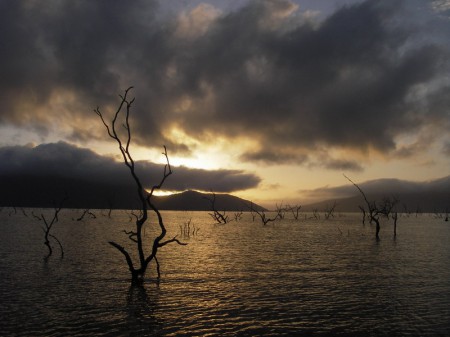 Two days later, again early in the morning, and despite the swerving to avoid a collision, we roll over a Bandicoot. The little creatures are all over the road and many of the guinea pig sized marsupials get killed every night.
Two days later, again early in the morning, and despite the swerving to avoid a collision, we roll over a Bandicoot. The little creatures are all over the road and many of the guinea pig sized marsupials get killed every night.
During our outings on the lake with Lindsay and on our own, we manage to catch some nice fish, two of them reaching the magic meter mark, the others being smaller. And we also meet Karen and Peter, two very friendly Aussie travellers from New South Wales and experienced and keen fishos. We are impressed by the perfect set up of their boat, where everything has its place and is within easy reach when needed.
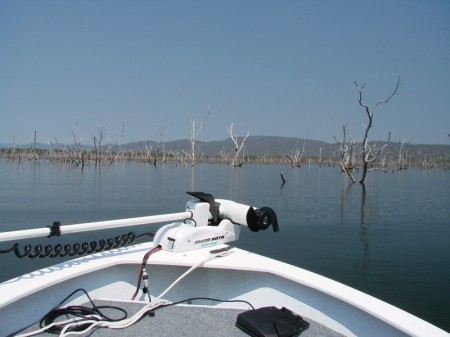 Geordie, Lindsay’s employee and right hand, tells us about some of his fishing spots and we have a ball catching Tarpon in a little creek meandering through the Proserpine golf course. Quite the opposite of our experience back home, the players are exceptionally friendly and don’t mind us being on their turf.
Geordie, Lindsay’s employee and right hand, tells us about some of his fishing spots and we have a ball catching Tarpon in a little creek meandering through the Proserpine golf course. Quite the opposite of our experience back home, the players are exceptionally friendly and don’t mind us being on their turf.
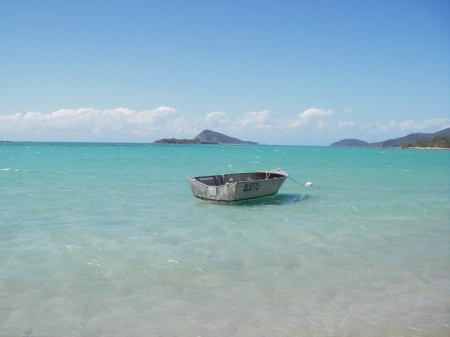 While in Cannonvale, we fall in love with one of the beaches nearby. Dingo beach and the small settlement along its shoreline are almost too good to be true. Fine, white sand, palms, shallow sand flats and a pub with cold drinks 50m from the beach; life doesn’t get much better than that. Wading and fishing soft plastics yields a range of species from flathead to small Giant Trevally, cod and Barracuda. One morning, the sight of a school of permit tailing in the shallow water gets us excited and with trembling hands we flick our lures into the fish’s path. The permit are extremely spooky though and even a small soft plastic making a little splash sees them going off like greased lightning and heading into deeper water. After only a couple of minutes the show is over and the fish disappear.
While in Cannonvale, we fall in love with one of the beaches nearby. Dingo beach and the small settlement along its shoreline are almost too good to be true. Fine, white sand, palms, shallow sand flats and a pub with cold drinks 50m from the beach; life doesn’t get much better than that. Wading and fishing soft plastics yields a range of species from flathead to small Giant Trevally, cod and Barracuda. One morning, the sight of a school of permit tailing in the shallow water gets us excited and with trembling hands we flick our lures into the fish’s path. The permit are extremely spooky though and even a small soft plastic making a little splash sees them going off like greased lightning and heading into deeper water. After only a couple of minutes the show is over and the fish disappear.
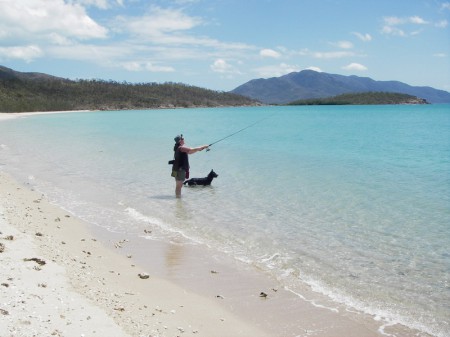 Another day a dog shows up out of nowhere and sits next to us in the water, watching every single move of ours and following us around for several hours until it eventually disappears again.
Another day a dog shows up out of nowhere and sits next to us in the water, watching every single move of ours and following us around for several hours until it eventually disappears again.
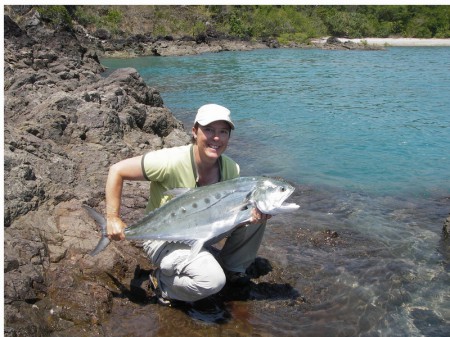 A little closer to Cannonvale is Coral Beach, a gem as well and one of the finest beaches for swimming, consisting entirely of pebbles and pieces of coral and framed by rocky headlands at both ends. We fish from the rocks with slightly heavier gear and catch a range of smaller coral species and lose a couple of bigger fish to the sharp rocks. Fishing poppers and walk the dog type lures is great fun and we manage to land some nice Queenfish, just reaching the meter mark. There are good sized Giant Trevally around as well, but they prove to be too powerful for our 8 – 10 kg outfits and we get busted big time every time we hook one of these brutes.
A little closer to Cannonvale is Coral Beach, a gem as well and one of the finest beaches for swimming, consisting entirely of pebbles and pieces of coral and framed by rocky headlands at both ends. We fish from the rocks with slightly heavier gear and catch a range of smaller coral species and lose a couple of bigger fish to the sharp rocks. Fishing poppers and walk the dog type lures is great fun and we manage to land some nice Queenfish, just reaching the meter mark. There are good sized Giant Trevally around as well, but they prove to be too powerful for our 8 – 10 kg outfits and we get busted big time every time we hook one of these brutes.
It’s a half an hour walk from the car park to Coral Beach, leading through dry eucalypt forest most of the time. While walking, we usually see brush turkeys foraging on the ground for a yummy morsel. These birds build large mounds out of leaf litter. The heat generated by the decomposing organic matter incubates the eggs buried in the mound by the female. The brush turkey controls the temperature and adds or removes material to maintain optimal conditions for the development of its offspring. Some of the mounds we come across are more than 2m high and 6m in diameter and have been used for many years.
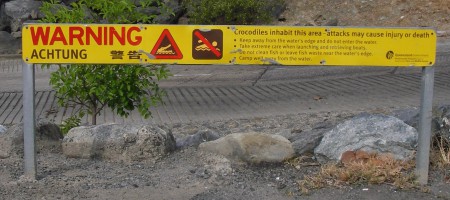 Along the beaches in the Whitsundays, we see the yellow signs warning of saltwater crocodiles again. The Australian saltwater crocodile is the largest crocodile in the world and has been sighted on the East coast as far south as Fraser Island. Crocodiles have been fully protected for many years now and their numbers have increased dramatically. The Proserpine River has become serious croc country in recent years and one can go for a croc spotting tour with a local operator. We have not come across a croc on this trip yet and are still looking forward to a reunion.
Along the beaches in the Whitsundays, we see the yellow signs warning of saltwater crocodiles again. The Australian saltwater crocodile is the largest crocodile in the world and has been sighted on the East coast as far south as Fraser Island. Crocodiles have been fully protected for many years now and their numbers have increased dramatically. The Proserpine River has become serious croc country in recent years and one can go for a croc spotting tour with a local operator. We have not come across a croc on this trip yet and are still looking forward to a reunion.